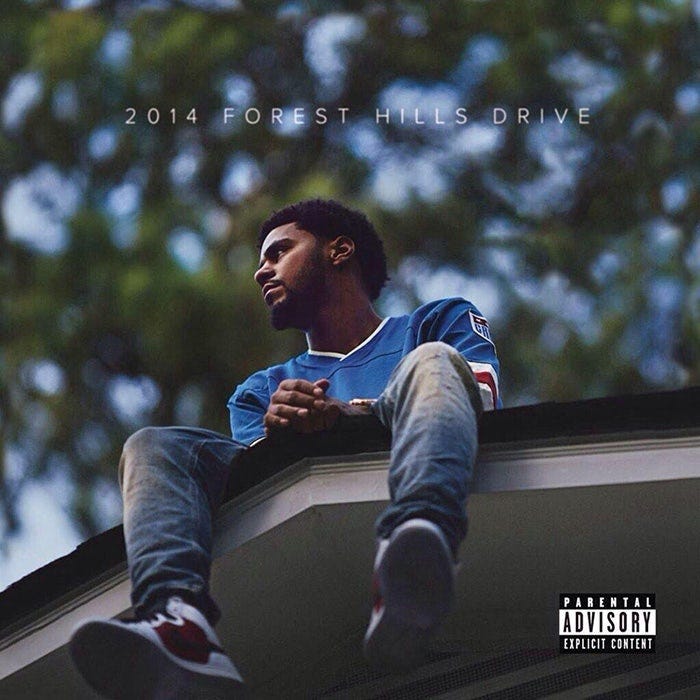J. Cole’s 2014 Forest Hills Drive: 10 Years of Impact
A decade after its release, J. Cole's 2014 Forest Hills Drive album stands tall as one of the most influential projects of the 2010s.
A Homecoming Rooted in Vulnerability
When 2014 Forest Hills Drive dropped in December 2014, it was more than an album—it was a journey back to J. Cole’s essence. Named after his childhood home in Fayetteville, North Carolina, the project radiated raw introspection, inviting listeners to sit on the porch of his memories and feel his struggles, triumphs, and revelations.
Cole tore up the industry playbook. No features. No flashy promo. No overhyped singles. It was just him—stripped down and baring his soul. In an era dominated by club anthems and superstar collaborations, this was a bold gamble. Tracks like “January 28th” and “No Role Modelz” painted a vivid mural of his life, his thoughts leaping off the beats like brushstrokes on a canvas. Meanwhile, “Love Yourz” and “Apparently” glowed with heartfelt gratitude, championing self-love in a genre often fixated on external validation.
The risk was worth it. The album debuted at No. 1 on the Billboard 200, carving its place in history as a triple-platinum masterpiece with zero guest features. That defiant individuality became an anthem in itself—a declaration of what hip-hop could be when it prioritizes artistry over spectacle.
Speaking to the Cultural Climate
Beyond its personal narratives, 2014 Forest Hills Drive held up a mirror to hip-hop and the world it inhabits. “Fire Squad” was a direct challenge, calling out the appropriation of Black culture with unflinching honesty. When Cole rapped, “White people have snatched the sound,” he wasn’t just spitting bars—he was lighting a torch, casting its glow on the inequities that permeate the music industry. Eminem, Macklemore, and Iggy Azalea weren’t targets; they were symbols of a larger systemic imbalance that needed to be addressed.
The album landed at a time when the Black Lives Matter movement was gathering momentum, its themes striking a chord with communities navigating racial injustice and systemic oppression. Tracks like “January 28th” became anthems of pride and empowerment, with Cole using his platform to urge fans to see the power in self-awareness and love.
The industry took notice. Rapper Reason told XXL, “2014 Forest Hills Drive is my favorite project because, in my opinion, it was the project that the world finally started giving Cole the credit he deserved. It’s a classic album, and Cole vividly painted a picture of his life without sacrificing commercial success or his core sound. But what else is new?”
The Game echoed this sentiment, calling the album “a breath of fresh air in a very polluted genre.” T.I. added, “It solidified him as a juggernaut in this rap shit. Born Sinner was a hard project to follow. Back-to-back classics is legendary shit.”
A Legacy That Echoes Today
Ten years later, 2014 Forest Hills Drive is still a blueprint for authenticity, its influence rippling through the work of artists like Kendrick Lamar, Rapsody, and Cordae. Themes of introspection, social critique, and rejecting materialism have become more prevalent in hip-hop, thanks in part to Cole’s fearless vulnerability on this project.
The album’s legacy is its contribution to a cultural shift. Cole’s honesty cracked open doors for deeper conversations about mental health, gratitude, and self-worth in hip-hop. Songs like “Love Yourz” remain sharp reminders of the beauty in appreciating one’s journey, resonating just as deeply in 2024 as they did in 2014.
A Call to Revisit Greatness
2014 Forest Hills Drive is a milestone in the cultural fabric of hip-hop and a testament to what happens when raw authenticity meets masterful storytelling.
Revisiting the album is like stepping into a time machine to relive the pulse of a transformative moment in hip-hop history. It’s a chance to sit with Cole on that roof, reflect on life’s trials and triumphs, and let the echoes of his journey inspire your own. In an ever-evolving genre, 2014 Forest Hills Drive proves that timeless artistry doesn’t just age well—it continues to lead, teach, and transform. Let it remind you why hip-hop is a movement and never just the moment.



